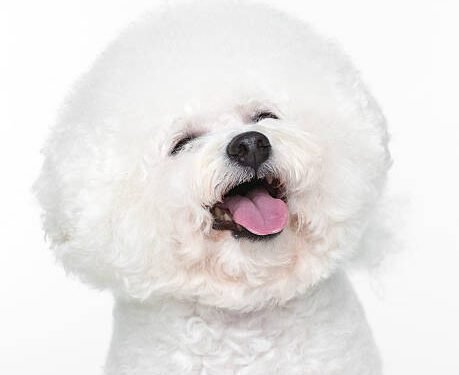The Bichon Frise, a delightful and charming breed, is a small dog with a big personality. When you think of the Bichon Frise, think of a vivacious and loving companion. But before we delve into the world of this remarkable breed, it’s essential to recognize the significance of selecting the right dog breed for your lifestyle.
The Significance of Breed Selection
When choosing a canine companion, it’s not a one-size-fits-all scenario. Different dog breeds come with their unique characteristics, temperaments, and requirements. The Bichon Frise is no exception. Your choice of breed can significantly impact your dog’s behavior, happiness, and overall well-being.
To help you make an informed decision, let’s delve into various aspects of the Bichon Frise breed. We’ve compiled a table with essential information that every prospective dog owner should consider:
| Field | Information about the Bichon Frise |
|---|---|
| Height | 9.5 to 11.5 inches (24 to 29 cm) |
| Weight | 12 to 18 pounds (5.4 to 8.2 kg) |
| Life Span | 12 – 15 years |
| Good with | Children, families, and those seeking a loving pet |
| Temperament | Affectionate, cheerful, and playful |
| Intelligence | High, quick learners with a love for fun |
| Shedding Amount | Low, minimal shedding |
| Grooming | Regular brushing and professional grooming |
| Exercise Needs | Moderate, daily walks and playtime |
| Energy Level | Energetic and lively |
| Barking Level | Low, usually alerting when necessary |
| Drool Amount | Low to none |
| Coat Length/Texture | Long and curly |
| Colors | White, white with apricot, cream, or gray |
| Patterns | Typically solid-colored |
These details provide an overview of what to expect when welcoming a Bichon Frise into your life. Now, let’s explore the world of this adorable breed and uncover the qualities that make them stand out in the canine kingdom.
Table of Contents
Breed History and Origin

Exploring Their Roots
The history of the Bichon Frise is a captivating journey that traces its origins to the Mediterranean region. This breed’s lineage can be linked to several small, white, curly-haired dogs, including the Bichon Tenerife, the Maltese, and the Bolognese. These charming little dogs were often favored by European nobility and found their way into the hearts of the French and Spanish courts.
The Bichon Frise’s captivating journey did not end there. During the 14th century, Italian sailors brought these delightful dogs to the Canary Islands, where the Bichon Tenerife, a precursor to the modern Bichon Frise, developed. These dogs became treasured companions for both sailors and the local population.
Fast forward to the 16th century, and these little dogs made their way to the French royal court. The French loved the Bichon Frise for its charming looks, playful personality, and exceptional charm. The breed quickly became a favorite in France, solidifying its place in history.
Notable Traits
What truly sets the Bichon Frise apart in the annals of dog history is its distinct combination of charm, intelligence, and striking appearance. These dogs are renowned for their curly, white coats and dark, expressive eyes, which give them an enchanting and unforgettable look. Their joyful, playful nature only adds to their appeal.
The Bichon Frise’s unique charm and charisma earned it a place in the hearts of many renowned artists and nobility. Famous painters like Francisco de Goya and Edouard Manet have immortalized the Bichon Frise in their works of art, showcasing the breed’s timeless allure.
Relevance of Origin
Understanding the origin of the Bichon Frise is essential for appreciating its distinctive characteristics today. Their Mediterranean roots and their association with European nobility have influenced their traits. The breed’s history as a cherished companion and performer in circuses and street fairs explains their outgoing and playful temperament.
Today, the Bichon Frise is a beloved breed known for its cheerful and affectionate nature. Their origin in the lap of luxury has left them with a sense of entitlement, and they often demand the spotlight. But this charming breed more than deserves its place in the sun, with its amusing antics, boundless enthusiasm, and an infectious zest for life.
As we continue to uncover the world of the Bichon Frise, we’ll explore more facets of their delightful personality, care requirements, and the essential role they play in the lives of those who choose them as their furry companions.
Understanding the Bichon Frise Breed’s Traits
The Bichon Frise is a breed that oozes charm, and its traits are as captivating as its history. In this section, we’ll delve into the physical characteristics, temperament, environment needs, common behavioral traits, and any notable breed varieties or subtypes of this enchanting breed.
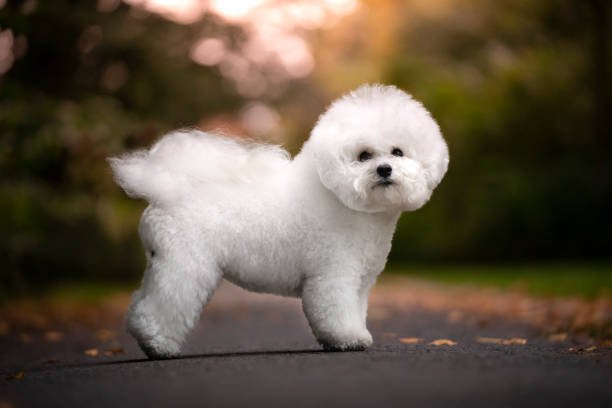
Physical Characteristics
Size: The Bichon Frise is a small breed, with adults typically standing at 9.5 to 11.5 inches (24 to 29 cm) at the shoulder. They usually weigh between 12 to 18 pounds (5.4 to 8.2 kg). Despite their diminutive size, they are well-proportioned and carry themselves with elegance.
Coat Type: What truly defines the Bichon Frise is its beautiful coat. Their fur is soft and curly, forming a cloud-like, all-white coat that’s hypoallergenic, making them an excellent choice for those with allergies. The coat not only gives them a distinctive look but also requires regular grooming to maintain its beauty.
Color and Distinguishing Features: The hallmark of the Bichon Frise is its curly, white coat. This breed’s expressive, dark eyes and black nose add to their charm. They sport a cheerful expression that’s complemented by their perpetually wagging tail.
Temperament Overview
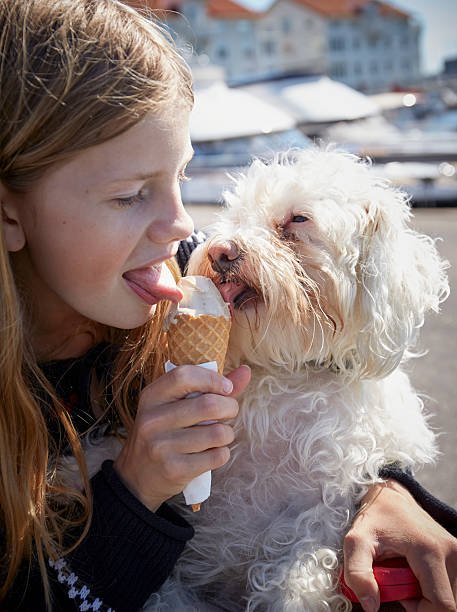
The Bichon Frise is known for its engaging and affectionate temperament. They are:
Affectionate: These dogs are incredibly loving and thrive on being the center of attention. Their affection knows no bounds, and they are happiest when cuddled up with their human family.
Cheerful: Bichon Frises have a naturally joyful disposition. They bring an air of positivity to any room and can brighten your day with their playful antics.
Playful: Playfulness is a defining trait of the Bichon Frise. They have a youthful spirit and love engaging in games and frolics.
Alert: Although they are not known to be aggressive, Bichon Frises are attentive and will bark when they sense anything amiss. This makes them excellent little watchdogs.
Environment Needs
The Bichon Frise is well-suited for a range of living conditions:
Living Space: Despite their small size, Bichon Frises are active indoors. They are quite adaptable and can thrive in apartments, provided they get their daily dose of exercise.
Climate: The Bichon Frise does well in various climates. Their dense coat keeps them warm in cooler weather, but it’s essential to protect them from extreme cold. In hot weather, ensure they have access to shade and water to prevent overheating.
Common Behavioral Traits
Understanding the common behavioral traits of Bichon Frises is essential for responsible ownership:
Intelligent and Trainable: Bichon Frises are highly intelligent and quick learners. They excel in obedience training and enjoy showing off their tricks.
Sociable: These dogs love to be around people and other animals. They thrive in a social environment and tend to get along well with children and other pets.
Grooming Needs: Bichon Frises have a high-maintenance coat that requires regular brushing to prevent matting. Many owners choose professional grooming to maintain their breed’s characteristic appearance.
Energy Levels: While they are playful, they are not overly energetic. A daily walk and some playtime are usually sufficient to meet their exercise needs.
Potential Challenges: Due to their strong attachment to their owners, Bichon Frises can develop separation anxiety if left alone for extended periods. Early training and socialization can help manage this.
Notable Breed Varieties
The Bichon Frise is a breed known for its consistency in appearance and temperament. While there are no distinct breed varieties, there may be variations in coat color, but the classic white coat remains the standard.
As we continue our exploration of the delightful Bichon Frise, we’ll delve deeper into their care requirements, health considerations, and the reasons why they make such wonderful companions for families and individuals alike.
Popularity and Recognition
Current Popularity
The Bichon Frise holds a special place in the hearts of dog enthusiasts and families worldwide, and its popularity remains steady. In recent years, this breed has maintained a consistent following, making it a favorite among those seeking an affectionate and charming companion.
One of the reasons behind the Bichon Frise’s enduring popularity is its enchanting personality. These dogs are well-suited for families, singles, and seniors alike. Their adaptability to various living situations, coupled with their loving nature, has endeared them to a broad spectrum of dog lovers.
As therapy dogs, Bichon Frises often bring comfort and joy to people in hospitals, nursing homes, and special needs facilities. Their gentle temperament and charming appearance make them ideal candidates for this vital role.
BreedRecognition
The Bichon Frise is officially recognized by various kennel clubs and organizations, solidifying its status as a distinct and cherished breed. Notable recognitions include:
- American Kennel Club (AKC): The American Kennel Club has recognized the Bichon Frise since the 1970s. This recognition ensures that the breed adheres to specific breed standards, including temperament, appearance, and health.
- The Kennel Club (UK): In the United Kingdom, the Bichon Frise is recognized by The Kennel Club. This recognition is crucial for breed enthusiasts and ensures that the breed adheres to British standards.
- Fédération Cynologique Internationale (FCI): The FCI, also known as the World Canine Organization, includes the Bichon Frise in its roster. This international recognition highlights the breed’s global presence.
Recognition by these kennel clubs and organizations matters for several reasons. It ensures that the Bichon Frise’s breeding adheres to specific standards, promoting the breed’s health and well-being. Furthermore, it provides a reliable reference for potential owners and breeders to find healthy, well-bred Bichon Frise puppies.
Notable Breed Varieties
The Bichon Frise is primarily known for its classic all-white coat. While there are no official breed varieties in terms of color or subtype, you may come across Bichon Frises with slight variations in coat color. These variations are more common in mixed-breed dogs that share their lineage with the Bichon Frise.
In some cases, you might encounter Bichon Frises with apricot, cream, or gray patches on their otherwise white coats. However, it’s essential to emphasize that such color variations do not meet the breed’s official standards, which recognize the classic all-white coat as the ideal representation of this enchanting breed.
As we progress through our exploration of the Bichon Frise, we’ll continue to uncover the breed’s health considerations, grooming requirements, and their role as devoted family members.
Care for Your Bichon Frise
Your Bichon Frise deserves the best care to lead a happy and healthy life. In this section, we’ll cover essential aspects of their well-being, including health considerations, grooming needs, nutritional requirements, exercise regimen, training tips, and the importance of socialization and interaction.
Health Considerations
Bichon Frises are generally a healthy breed, but like all dogs, they can be prone to certain health issues. Here are some common health concerns associated with the Bichon Frise:
1. Allergies: These dogs can be susceptible to allergies, particularly skin allergies, which can result in itching and discomfort. Regular grooming and high-quality food can help manage this issue.
2. Hip Dysplasia: Hip dysplasia can affect the Bichon Frise, leading to pain and mobility problems. Proper exercise, maintaining a healthy weight, and a balanced diet can reduce the risk.
3. Dental Health: This breed can be prone to dental issues, so it’s essential to practice good dental hygiene, including regular teeth brushing.
4. Patellar Luxation: Patellar luxation, a condition where the kneecap temporarily dislocates, can occur in Bichon Frises. Regular vet check-ups can help detect and address this issue early.
5. Eye Problems: Certain eye conditions can affect the Bichon Frise, including cataracts and progressive retinal atrophy. Regular eye exams can help manage these issues.
Regular veterinary check-ups, a well-balanced diet, proper exercise, and a healthy living environment are essential for maintaining the health of your Bichon Frise. Early detection and prompt treatment of any health issues are critical to ensuring your dog’s well-being.
Grooming Needs
Grooming is a significant part of caring for a Bichon Frise due to their distinctive coat. Here’s what you need to know:
1. Brushing: Regular brushing is essential to prevent matting and maintain the coat’s beauty. Brush your Bichon Frise several times a week, and consider professional grooming every 4-6 weeks.
2. Bathing: Frequent baths can help keep your Bichon Frise clean and looking their best. Be sure to use a mild dog shampoo.
3. Nail Trimming: Regular nail trimming is crucial to prevent overgrowth and discomfort. If you’re not comfortable doing this yourself, a professional groomer or vet can help.
4. Ear Cleaning: Check their ears regularly and clean them as needed to prevent infections.
5. Dental Care: Brush their teeth regularly or provide dental chews and toys to maintain their oral health.
Nutritional Requirements
A well-balanced diet is essential to keep your Bichon Frise healthy. High-quality commercial dog food that meets their specific age and size requirements is a good choice. Consider your dog’s age, activity level, and any dietary restrictions when selecting the right food.
Ensure that fresh water is always available, and measure their food to prevent overfeeding. Bichon Frises are prone to obesity, so be cautious about portion control and avoid too many treats.
Exercise Regimen
Bichon Frises may be small, but they have a playful and energetic nature. They need daily exercise to keep them happy and healthy. A daily walk, interactive playtime, and the occasional trip to a dog park can help burn off their energy.
Training Tips
Bichon Frises are intelligent dogs and enjoy learning new tricks and commands. Positive reinforcement training methods work best with this breed. Be patient, consistent, and reward good behavior to ensure they are well-behaved and obedient.
Socialization and Interaction
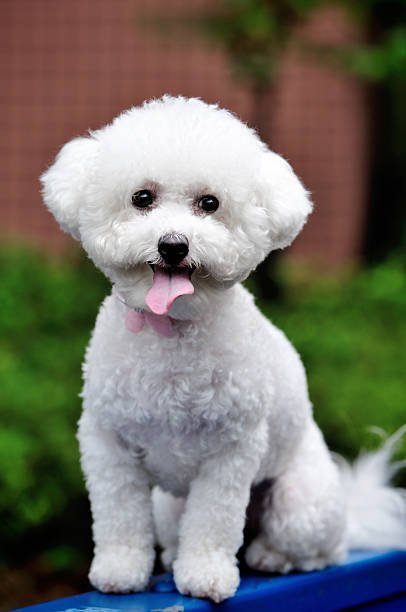
These social dogs thrive on interaction with their human family. Ensure they are part of your daily life, and expose them to various people, pets, and environments to promote positive socialization.
Maintaining the health and well-being of your Bichon Frise is of utmost importance. In this section, we’ll explore common health issues, the significance of regular vet check-ups and vaccinations, preventative measures, grooming, dental hygiene, and recognizing signs of illness.
Common Health Issues
Bichon Frises are generally a healthy breed, but like all dogs, they can be prone to specific health concerns. Common health issues in Bichon Frises include:
1. Allergies: Allergies, particularly skin allergies, are a prevalent issue in Bichon Frises. You may notice your dog scratching, licking, or biting their skin. Addressing allergies often requires dietary changes and may involve working closely with your vet.
2. Hip Dysplasia: This orthopedic condition can affect the hip joints, leading to discomfort and mobility issues. While it’s not as common in Bichon Frises as in larger breeds, it’s still a potential concern.
3. Dental Problems: Bichon Frises are prone to dental issues, including periodontal disease. Regular dental care is essential to maintain oral health.
4. Patellar Luxation: This condition involves the kneecap temporarily dislocating and can affect Bichon Frises. Regular vet check-ups can help identify and address this problem early.
5. Eye Conditions: Progressive retinal atrophy and cataracts are known eye problems in this breed. Regular eye examinations can help manage these issues.
6. Ear Infections: Due to their floppy ears, Bichon Frises can be prone to ear infections. Regular ear cleaning and inspection are crucial.
7. Skin Conditions: Bichon Frises can develop skin conditions, including hot spots and fungal infections. It’s important to address these issues promptly to prevent discomfort.
Regular Vet Check-Ups and Vaccinations
Routine veterinary check-ups are vital to ensure your Bichon Frise’s health. These check-ups typically include vaccinations, which are essential for preventing diseases. A common vaccination schedule for Bichon Frises includes:
- Puppy Vaccinations: These are typically given at 6, 8, 10, and 12 weeks and include core vaccines like distemper, parvovirus, and adenovirus.
- Booster Shots: Your Bichon Frise will need booster shots to maintain immunity. These are given at specific intervals throughout their life.
- Rabies Vaccine: Rabies vaccinations are usually administered around 12-16 weeks and then given as boosters, depending on local laws.
- Other Vaccinations: Your vet may recommend additional vaccines based on your location and your dog’s lifestyle.
Remember to follow your veterinarian’s advice regarding vaccinations and have regular check-ups to catch and address health issues early.
Preventative Measures
Maintaining your Bichon Frise’s health requires preventative measures. These include:
- Flea and Tick Prevention: Use flea and tick prevention products to keep your dog safe from these pests.
- Heartworm Prevention: Administer heartworm prevention medication as recommended by your vet.
- Regular Grooming: Frequent grooming sessions are crucial to maintaining your Bichon Frise’s coat and skin health.
- Dental Care: Brush your dog’s teeth regularly and provide dental chews and toys.
- Ear and Nail Care: Clean your dog’s ears and trim their nails as needed to prevent infections and overgrowth.
- Balanced Diet: Feed your Bichon Frise a well-balanced diet to support their overall health.
Grooming
Grooming plays a significant role in the health and appearance of your Bichon Frise. Here’s what you need to know:
- Brushing: Regular brushing is crucial to prevent matting of their soft, curly coat. Brush them several times a week.
- Bathing: Bichon Frises should be bathed every 3-4 weeks to keep their coat clean and healthy. Use a mild dog shampoo.
- Nail Trimming: Regular nail trimming is essential to prevent overgrowth, which can cause discomfort and affect their gait.
- Ear Cleaning: Check their ears regularly and clean them as needed to prevent infections. Be cautious and gentle when cleaning their ears.
- Dental Care: Brush your Bichon Frise’s teeth regularly or provide dental chews and toys to maintain their oral health.
- Skin Care: If your Bichon Frise has skin allergies or develops hot spots, consult your vet for specific care instructions.
Recognizing Signs of Illness
It’s essential to be attentive to any signs of illness or discomfort in your Bichon Frise. Common signs of illness or distress may include:
- Lethargy: A sudden lack of energy or enthusiasm.
- Appetite Changes: Significant changes in eating habits, whether increased or decreased.
- Vomiting or Diarrhea: Frequent or severe episodes of vomiting or diarrhea.
- Coughing or Sneezing: Persistent coughing or sneezing, which could indicate respiratory issues.
- Limping or Mobility Issues: Difficulty in moving, especially in the limbs or joints.
- Changes in Bowel or Urinary Habits: Straining, blood in urine or stool, or any unusual changes.
- Excessive Scratching or Licking: Frequent scratching, licking, or biting of the skin.
- Eye Issues: Redness, discharge, squinting, or changes in eye appearance.
If you notice any of these signs, contact your veterinarian promptly. Early detection and treatment can make a significant difference in your Bichon Frise’s health.
Bichon Frise as Therapy Dogs
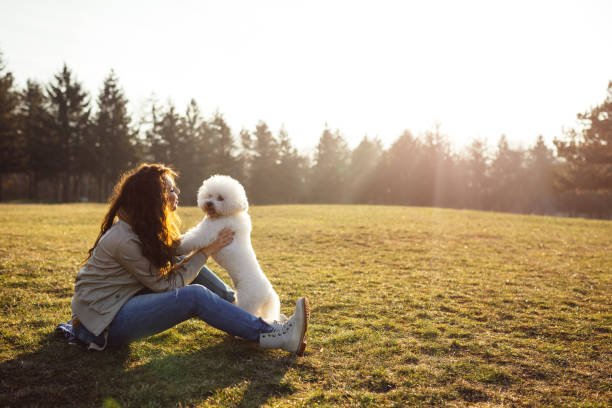
The Bichon Frise, with its cheerful and affectionate nature, is an ideal candidate for therapy work. In this section, we’ll explore why Bichon Frises make excellent therapy dogs, the role and benefits of therapy dogs, the training and certification process, success stories, and the unique qualities that make this breed a perfect fit for this important role.
Suitability for Therapy Work
Bichon Frises are well-suited for therapy work due to their gentle and loving disposition. Their characteristics, including their playful nature, loyalty, and desire to be close to people, make them excellent therapy dogs. They bring joy and comfort to individuals in various settings, such as hospitals, nursing homes, schools, and special needs facilities.
Role and Benefits of Therapy Dogs
Therapy dogs play a crucial role in providing emotional support, companionship, and comfort to people in need. Their presence alone can alleviate stress and anxiety, boost morale, and create a positive atmosphere. Here are some of the key benefits of therapy dogs:
1. Emotional Support: Therapy dogs offer emotional support to individuals going through challenging situations, such as medical treatments or emotional distress.
2. Physical Benefits: The presence of a therapy dog has been shown to reduce blood pressure, lower stress levels, and even promote faster healing in some cases.
3. Social Interaction: Therapy dogs encourage social interaction, especially in individuals who may be isolated or have difficulty communicating.
4. Mood Enhancement: The mere act of petting a therapy dog can release endorphins and improve mood.
5. Distraction: For patients in healthcare facilities, therapy dogs provide a welcome distraction from pain and discomfort.
Training and Certification
Training a Bichon Frise to become a therapy dog involves several steps, including obedience training, socialization, and certification. Here’s a general overview of the process:
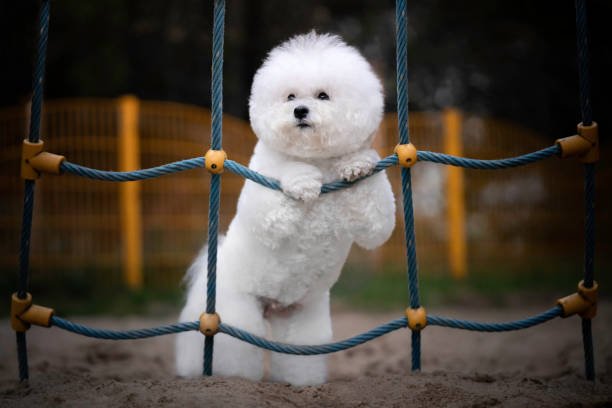
1. Basic Obedience Training: Your Bichon Frise should have a solid foundation in basic obedience commands, including sit, stay, come, and walking on a leash.
2. Socialization: Expose your dog to various people, environments, and situations to ensure they are comfortable and well-behaved in different settings.
3. Canine Good Citizen (CGC) Test: The CGC test is a program offered by the American Kennel Club (AKC) to assess a dog’s obedience and temperament. Passing the CGC test is often a prerequisite for therapy dog training.
4. Therapy Dog Training: Enroll your Bichon Frise in a therapy dog training program. This specialized training focuses on behaviors and skills required for therapy work, such as interacting gently with individuals and remaining calm in various situations.
5. Certification: After completing the training, you’ll need to get your Bichon Frise certified through a recognized therapy dog organization. Certification requirements may vary depending on the organization.
Success Stories and Examples
Bichon Frises have a history of success as therapy dogs. There are countless heartwarming stories of these dogs bringing comfort and joy to individuals in need. Here are a few examples:
- Hospital Visits: Bichon Frises have provided solace to patients undergoing treatments in hospitals, helping them feel less anxious and more optimistic.
- Nursing Home Companions: In nursing homes, Bichon Frises have been a source of companionship and affection for elderly residents, reducing feelings of loneliness.
- Special Education Support: In schools and special education settings, therapy dogs, including Bichon Frises, have assisted children with various needs, improving their confidence and communication skills
Feeding Recommendations for Bichon Frises
Feeding your Bichon Frise a well-balanced diet is essential to ensure their health and well-being. To keep your Bichon Frise in optimal condition, consider the following dietary recommendations based on their size, age, and activity level.
1. Age: Bichon Frises have different nutritional needs at various stages of life:
- Puppy Stage (up to 12 months): During this stage, puppies require a diet specially formulated for their growth and development. Choose high-quality puppy food with essential nutrients to support their bones, muscles, and overall health. Feed them according to the manufacturer’s guidelines.
- Adult Stage (1 to 7 years): Adult Bichon Frises should transition to well-balanced adult dog food. Look for options that meet their energy requirements without overloading them with calories. A daily feeding regimen is appropriate, typically divided into two meals per day.
- Senior Stage (7 years and older): Senior Bichon Frises may benefit from specialized senior dog food tailored to their needs. These foods often contain joint supplements and fewer calories to accommodate their lower activity levels. Keep an eye on their weight and adjust their diet if necessary.
2. Size: The size of your Bichon Frise matters when determining portion sizes. Smaller dogs need fewer calories than larger breeds. Typically, Bichon Frises weigh between 12 to 18 pounds. Always follow the feeding recommendations provided on the dog food label, which are often based on the dog’s weight.
3. Activity Level: Bichon Frises are active little dogs. If your dog is particularly active, they may require a bit more food to fuel their energy. On the other hand, if your Bichon Frise is less active or senior, you’ll need to adjust their portion size to prevent excess weight gain.
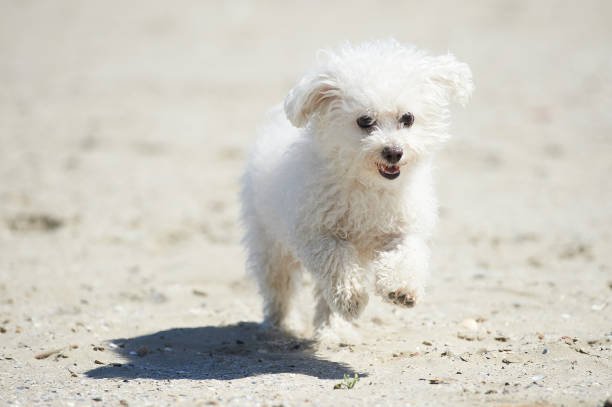
4. Dietary Restrictions and Allergies: Like all breeds, Bichon Frises can have dietary restrictions and allergies. Common allergens include poultry, grains, and certain proteins. If you suspect your Bichon Frise has food sensitivities or allergies, consult your veterinarian to determine an appropriate diet. They might recommend hypoallergenic or limited-ingredient dog food.
5. Feeding Schedules: Establish a regular feeding schedule for your Bichon Frise. Feeding them at consistent times each day helps with digestion and prevents overeating. Many owners choose to feed their Bichon Frise twice a day, providing one portion in the morning and one in the evening. This schedule can help regulate their energy levels and minimize the risk of bloating, a condition more common in deep-chested breeds.
6. Portion Control: Pay attention to portion control to maintain your Bichon Frise’s healthy weight. Overfeeding can lead to obesity, which is detrimental to their health. Use a measuring cup to ensure you’re providing the recommended portion sizes based on your dog’s age and weight. Adjust their portions as needed to maintain their ideal weight.
Remember that every dog is unique, and their dietary needs may vary. Regularly monitor your Bichon Frise’s weight, energy levels, and overall health, and consult your veterinarian if you have concerns about their diet. Proper nutrition is a fundamental aspect of caring for your Bichon Frise, ensuring they live a long and healthy life.
Personal Stories and Testimonials
To truly understand the appeal of the Bichon Frise as a family member, it’s invaluable to hear from real-life owners who have experienced the joys and challenges of having this breed as part of their lives. Here, we present some heartwarming personal stories and testimonials from Bichon Frise owners:
Bella: The Heart of Our Home
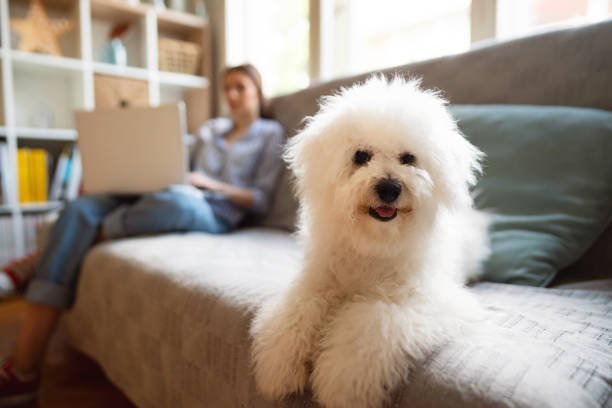
Testimonial by Emily
Bella, our Bichon Frise, has been the heart of our home for the past seven years. From the moment she entered our lives, she brought an abundance of joy and laughter. Bella’s affectionate nature is something that’s difficult to put into words. Every morning, she greets us with a wagging tail and endless kisses. Her love knows no bounds, and it’s a beautiful feeling to come home to such unconditional affection.
What’s truly remarkable about Bella is her adaptability. We live in a cozy apartment, and she’s content with daily walks and indoor play. Her small size makes her a perfect fit for apartment living. Yet, her playful antics and infectious energy have us laughing constantly.
Bella’s alertness is another trait we treasure. She might be small, but she takes her role as a watchdog seriously. Her bark is our first line of defense against unexpected visitors, and we appreciate her protective instinct.
We’ve also enjoyed watching Bella interact with our children. She’s been a patient and loving companion to our two kids. Her playful nature makes her a fantastic playmate, and we’ve seen our children learn valuable lessons in responsibility and empathy through caring for Bella.
As a family, we couldn’t imagine life without Bella. She’s more than a pet; she’s a beloved member of our family. If you’re considering bringing a Bichon Frise into your life, be prepared for a lifetime of love, laughter, and enduring companionship.
Rocky: A Joyful Addition to Our Family
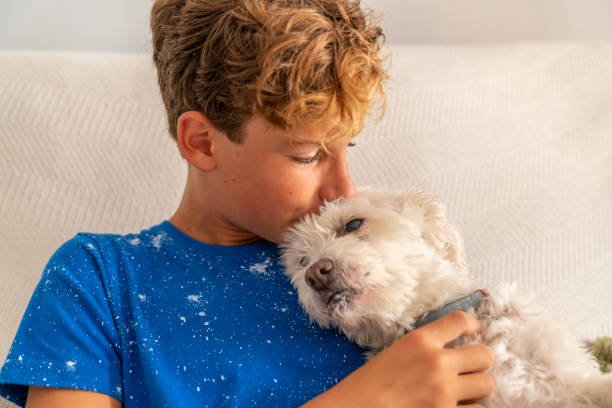
Testimonial by Mark and Sarah
When we decided to add a dog to our family, we did extensive research to find the perfect breed. We were looking for a dog that would be great with our kids, adapt well to apartment living, and bring joy into our home. That’s when we came across the Bichon Frise, and we’ve never looked back since.
Rocky, our Bichon Frise, has been a joyous addition to our family. His cheerful personality is infectious. He’s a small package of boundless energy, always ready to play, whether it’s fetch, hide and seek, or a simple game of tug-of-war. We have yet to meet a dog as enthusiastic about life as Rocky.
His affectionate nature has made him a cherished member of our family. He’s equally comfortable cuddling on the couch or running around the local park. We’ve also been pleasantly surprised by how well he gets along with our kids. He’s patient and gentle, and he’s taught our children about responsibility and the importance of caring for a living being.
Grooming Rocky has become a bonding experience. While his coat requires regular maintenance, it’s an opportunity for us to pamper him and show our love. He’s become a stylish little gentleman thanks to his regular grooming sessions.
Rocky has truly become an inseparable part of our family, and we’re grateful for the countless smiles and laughter he brings into our lives. If you’re looking for a dog that’s not just a pet but a source of constant joy, a Bichon Frise might be the perfect choice for your family.
The Cost of Owning a Bichon Frise
While the joys of owning a Bichon Frise are immeasurable, it’s important to be prepared for the financial aspects of dog ownership. Bringing a Bichon Frise into your family involves both upfront costs and ongoing expenses.
Upfront Costs
- Adoption or Purchase: The initial cost of acquiring a Bichon Frise can vary widely. Adoption fees from rescue organizations typically range from $100 to $500, while purchasing a Bichon Frise from a reputable breeder can cost anywhere from $1,000 to $3,000 or more.
- Supplies: You’ll need to invest in essential supplies like food and water bowls, a leash and collar, a crate or bed, toys, grooming tools, and identification tags. These initial purchases can cost around $100 to $300, depending on the quality of the items you choose.
- Veterinary Expenses: Your new Bichon Frise will require an initial vet visit for vaccinations, deworming, and a health check. This can cost around $100 to $300. Don’t forget to factor in the cost of spaying or neutering, which typically ranges from $150 to $300. Microchipping for identification can cost an additional $50 to $75.
- Training and Socialization: Enrolling your Bichon Frise in puppy training classes is highly recommended. Classes can cost around $100 to $200 for a basic course.
- Pet Insurance: While optional, pet insurance can provide financial security in case of unexpected veterinary bills. Monthly premiums vary, but they generally start at $20 to $30.
- License and Registration: Many municipalities require dog owners to obtain a license for their pets, which can cost $10 to $20 annually.
Ongoing Expenses
- Food: The cost of food depends on the quality and brand you choose. On average, expect to spend $20 to $60 per month on high-quality dog food.
- Grooming: Bichon Frises require regular grooming, which can be done professionally or at home. Professional grooming every 4-6 weeks can cost $40 to $75 per session, while grooming supplies for home use will incur a one-time cost of $100 to $200.
- Veterinary Care: Routine vet visits for vaccinations, check-ups, and preventive care can add up to $200 to $400 annually. Be prepared for potential emergency vet visits, which can range from a few hundred to a few thousand dollars depending on the issue.
- Medications and Preventatives: Costs for flea and tick prevention, heartworm medication, and any other necessary medications can vary but typically amount to $20 to $50 per month.
- Training and Socialization: Ongoing training classes or socialization activities can cost $100 to $300 annually.
- Toys and Supplies: Replacing worn-out toys and restocking supplies can add an additional $100 to $200 per year.
- Pet Insurance: Monthly pet insurance premiums and potential deductibles for any health issues can range from $20 to $50 or more per month.
- License Renewal: Remember to budget for the annual renewal of your dog’s license, typically $10 to $20.
It’s important to budget for these expenses to provide your Bichon Frise with the best care possible. Keep in mind that these are average costs, and actual expenses may vary depending on your location, the specific needs of your dog, and the choices you make for their care.
Owning a Bichon Frise is not just a financial commitment; it’s a lifelong commitment of love, care, and devotion. The joy and companionship they bring to your life are immeasurable, making them a valuable addition to any family.
Grooming and Care for Your Bichon Frise
Proper grooming and care are essential to keep your Bichon Frise looking and feeling their best. This breed’s beautiful coat, while a standout feature, requires regular maintenance. In this section, we’ll provide you with general grooming advice and recommend specific accessories and care products tailored to the Bichon Frise breed’s unique needs.
Grooming Tips
Grooming your Bichon Frise not only ensures their appearance stays pristine but also contributes to their overall well-being. Here are some essential grooming tips:
1. Brushing: Regular brushing is a must to prevent matting and maintain that characteristic fluffy coat. You should brush your Bichon at least every other day, if not daily. Invest in a high-quality slicker brush to make the process easier. Make sure to be gentle, as their skin is delicate.
2. Bathing: Frequent baths are necessary to keep your Bichon Frise clean and looking their best. Aim for a bath every three to four weeks, using a mild dog shampoo. Make sure to rinse thoroughly to prevent any residue from irritating their skin.
3. Hair Trimming: Regular hair trimming is required, whether you’re maintaining a longer show-style coat or a shorter pet-style trim. Many Bichon Frise owners opt for professional grooming every 4-6 weeks to keep their pup looking their best.
4. Ear Cleaning: Bichon Frises are prone to ear infections due to their floppy ears. Clean their ears regularly and consult your vet for guidance on the best cleaning solutions. Be gentle to avoid damaging their ears.
5. Nail Trimming: Keep their nails trimmed to prevent overgrowth, which can be uncomfortable for your dog. If you’re unsure about doing this yourself, seek the help of a professional groomer or your vet.
6. Dental Care: Brush your Bichon’s teeth regularly to prevent dental issues. Dental health is essential for their overall well-being. Dental chews and toys can also help maintain oral hygiene.
7. Eye Care: Check their eyes for any signs of discharge, redness, or irritation. Regular eye cleaning can prevent issues, and if you notice anything unusual, consult your vet.
8. Anal Gland Expression: This is a less glamorous but necessary part of grooming. Some Bichon Frises may need their anal glands expressed, which can be done by a professional groomer or your vet.
Recommended Accessories and Care Products
To make the grooming process more manageable and enjoyable for both you and your Bichon Frise, consider these specific accessories and care products:
1. Slicker Brush: A high-quality slicker brush is an absolute essential for keeping their coat in top condition.
2. Grooming Table: If you plan on grooming your Bichon at home, investing in a grooming table can make the process easier on your back and more comfortable for your dog.
3. Professional Grooming Services: While some owners groom their Bichon Frises at home, professional grooming services are often the best choice for maintaining their breed’s unique look.
4. Dog Shampoo: Choose a mild, dog-specific shampoo to ensure it’s gentle on their sensitive skin.
5. Ear Cleaning Solution: Invest in a proper ear cleaning solution for your Bichon Frise. Consult your vet for a suitable brand and guidance on how to use it.
6. Nail Clippers: If you’re confident in trimming your Bichon’s nails yourself, a good pair of dog nail clippers is essential. Alternatively, schedule regular nail trims with a professional.
7. Dental Care Products: Consider dog-specific toothbrushes, toothpaste, and dental chews to maintain their oral health.
8. Eye Wipes: In addition to regular eye checks, keep some dog-friendly eye wipes on hand for quick and gentle clean-ups.
Remember that grooming is not only about maintaining your Bichon Frise’s appearance but also plays a crucial role in their overall health and well-being. Regular grooming sessions can be an excellent bonding opportunity and a way to ensure your furry friend remains happy, healthy, and comfortable.
Choosing and Adopting a Bichon Frise Dog Breed
Reasons for Adoption
Adopting a Bichon Frise is a rewarding experience that comes with numerous benefits. Choosing to adopt, rather than buying from a breeder or pet store, not only provides a loving home for a dog in need but also has several advantages:
1. Saving a Life: One of the most significant benefits of adopting a Bichon Frise is that you’re giving a rescue dog a second chance at life. Many dogs in shelters and rescue organizations are looking for loving families, and your decision to adopt can save a life.
2. Supporting Animal Welfare: By adopting from a shelter or rescue, you’re actively supporting animal welfare initiatives. It sends a powerful message against puppy mills and unethical breeding practices.
3. Providing a Home to a Loving Companion: Bichon Frises are known for their affectionate and loyal nature. When you adopt one, you’re gaining a loving and devoted companion who will bring joy and laughter to your life.
4. Variety of Choices: Shelters and rescue organizations have dogs of all ages, including puppies, adults, and seniors. You have the flexibility to choose a Bichon Frise that fits your lifestyle and preferences.
5. Cost Savings: Adopting a dog is often more cost-effective than purchasing one from a breeder. Adoption fees typically cover vaccinations, spaying or neutering, and sometimes even microchipping.
6. Reducing Overpopulation: Choosing adoption helps reduce the overpopulation of dogs in shelters and rescues. It’s a responsible choice for those who care about the welfare of animals.
Research and Preparation
Before you adopt a Bichon Frise, it’s essential to conduct thorough research and prepare for the responsibilities that come with dog ownership. Here’s what you should consider:
1. Breed-Specific Needs: Understand the specific needs of the Bichon Frise breed. This includes their grooming requirements, exercise needs, and potential health issues. Being well-informed about the breed will help you provide the best care.
2. Financial Responsibilities: Owning a dog comes with financial commitments. You’ll need to budget for food, grooming, veterinary care, and other essentials. Be sure you can comfortably provide for your Bichon Frise.
3. Lifestyle and Living Situation: Evaluate your lifestyle and living situation. Ensure that you have the time and space to accommodate a dog. Bichon Frises are adaptable but still require attention and exercise.
4. Commitment: Dogs, including Bichon Frises, are long-term commitments. They can live 15 years or more. Be sure you’re ready for the responsibility and can provide a stable home for your furry friend.
5. Training and Socialization: Consider the time and effort required for training and socializing your Bichon Frise. Proper training is essential to ensure they are well-behaved and obedient.
6. Choosing a Reputable Rescue or Shelter: Research local shelters and rescue organizations with a good reputation. Look for those that have experience with the Bichon Frise breed and can provide you with detailed information about the dog’s history and temperament.
Adoption Process
Adopting a Bichon Frise involves several steps, which may vary depending on the shelter or rescue organization. Here’s a general overview of the adoption process:
1. Application: You’ll start by filling out an adoption application. This application typically asks questions about your living situation, experience with dogs, and your expectations as a dog owner.
2. Home Visit: Some rescue organizations may conduct a home visit to ensure that your living environment is suitable for a Bichon Frise. This is done to ensure the safety and well-being of the dog.
3. Meet and Greet: Once your application is approved, you’ll have the opportunity to meet the available Bichon Frises. This is a chance to interact with the dogs and see which one is the best fit for your family.
4. Adoption Fee: There is usually an adoption fee, which helps cover the costs of vaccinations, spaying or neutering, and other care the dog has received while in the rescue organization’s care.
5. Adoption Agreement: You’ll be required to sign an adoption agreement, which outlines your responsibilities as a dog owner and the organization’s expectations.
6. Bring Your Bichon Frise Home: After completing the necessary paperwork and paying the adoption fee, you can bring your Bichon Frise home and begin your life together.
Breeding and Ethical Considerations
If you ever consider obtaining a Bichon Frise from a breeder rather than adopting, it’s crucial to emphasize responsible breeding practices. Ethical breeders prioritize the health and well-being of the dogs and ensure genetic diversity. Here are some key points to keep in mind:
1. Health Screening: Responsible breeders conduct thorough health screening for their breeding dogs. This helps reduce the risk of genetic health issues being passed on to puppies.
2. Genetic Diversity: Ethical breeders aim to maintain genetic diversity within the breed. Inbreeding can lead to health problems, so they carefully select breeding pairs to avoid this.
3. Proper Care for Puppies: Ethical breeders provide proper care and socialization for puppies, ensuring they are well-adjusted and healthy before going to their new homes.
4. Avoid Puppy Mills: Do not support puppy mills, which prioritize profit over the welfare of dogs. Always choose reputable breeders who prioritize the health and happiness of their dogs.
By adopting a Bichon Frise or choosing a responsible breeder, you can be confident that you are contributing to the well-being of these wonderful dogs and providing them with the love and care they deserve.
FAQs
Are Bichon Frises hypoallergenic?
Yes, Bichon Frises are considered hypoallergenic due to their low-shedding, curly coat. However, it’s essential to note that no dog is entirely hypoallergenic, and individual reactions can vary.
How often should I groom my Bichon Frise?
Bichon Frises require regular grooming. Brush their coat several times a week to prevent matting. Many owners opt for professional grooming every 4-6 weeks to maintain their distinctive appearance.
Do Bichon Frises get along with other pets?
Bichon Frises are typically friendly and can get along with other pets when properly socialized. It’s essential to supervise initial interactions and introduce them gradually.
Can Bichon Frises live in apartments?
Yes, Bichon Frises can adapt well to apartment living. While they are active indoors, daily exercise and playtime are still essential to keep them happy and healthy.
Do Bichon Frises bark a lot?
Bichon Frises are alert and may bark when they sense something unusual, but they are not known for excessive barking. Their alertness makes them good watchdogs.
What is the average lifespan of a Bichon Frise?
Bichon Frises typically live for 12 to 15 years with proper care. Some may live longer with a healthy lifestyle and regular vet check-ups.
Are Bichon Frises good for families with children?
Yes, Bichon Frises are known for their gentle and playful nature, making them great companions for families with children. However, supervision is essential to ensure positive interactions.
Do Bichon Frises suffer from separation anxiety?
Bichon Frises are known to form strong bonds with their owners and can experience separation anxiety if left alone for extended periods. Early training and gradual departures can help manage this.
What kind of exercise do Bichon Frises need?
Bichon Frises are moderately active. They require daily walks and playtime to burn off energy. Interactive toys and games can keep them mentally stimulated.
Are Bichon Frises good for first-time dog owners?
Yes, Bichon Frises can be suitable for first-time dog owners due to their friendly and trainable nature. However, prospective owners should be prepared for regular grooming needs and socialization requirements.
















